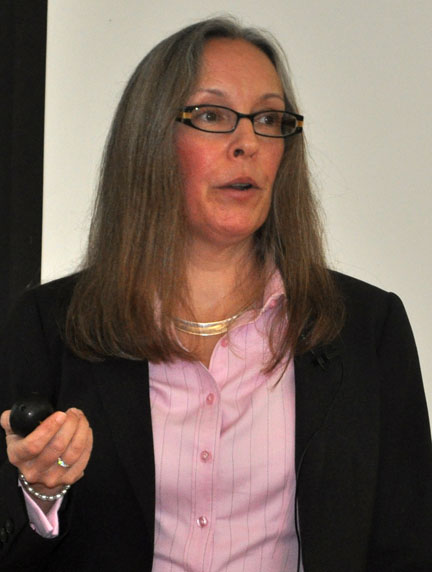Reimagining law in a complex world involves innovations that cross the boundaries of states and law firms, according to a University of Southern California law and economics professor.

Gillian Hadfield was a guest lecturer at the University of Toronto Faculty of Law’s David B. Goodman Lecture program yesterday. She told law students and professors the more complex the world becomes, the more complex laws have become in response.
“The problem is, the solution is giving us more of the same,” she said, noting that complex laws are make justice systems more expensive, even slower, and less aligned with needs.
“I keep thinking, where is the iPhone of law?” she said, “which is to say, the iPhone has really complex stuff that it is capable of doing.”
A move toward simpler and more effective systems will involve thinking outside lawmaking and looking beyond the boundaries of law firms, she said.
Although she did not endorse them, Hadfield talked about possibilities including the outsourcing of adjudication and privatization of regulatory regimes.
“We do see examples of this,” she said.
English judges adjudicate matters at the Dubai International Financial Centre, she said and the U.K. has revampe its regulatory regime to allow for alternative business structures.
There are also changes now in how law firms are working, said Hadfield.
“We’re constantly now jumping the boundaries of the firm in our production systems,” she said. She talked about what she calls “de-verticalization” of production within law firms, which results in a network system where much of the work gets down outside of the firm.
“These networks of supply chain are truly global,” Hadfield also said.
A new law profession will need new business models, outside capital, and bringing non-lawyers to the table, according to Hadfield.
“What does this mean for the profession? I think it means we need think about giving up exclusivity,” she added, noting that legal professional other than lawyers have a great role to play.
“I find the word ‘non-lawyer’ a bit of an insult,” she said. “We don’t have non-doctors, we have multiple types of medical professionals.”

 Gillian Hadfield was a guest lecturer at the University of Toronto Faculty of Law’s David B. Goodman Lecture program yesterday. She told law students and professors the more complex the world becomes, the more complex laws have become in response.
Gillian Hadfield was a guest lecturer at the University of Toronto Faculty of Law’s David B. Goodman Lecture program yesterday. She told law students and professors the more complex the world becomes, the more complex laws have become in response.